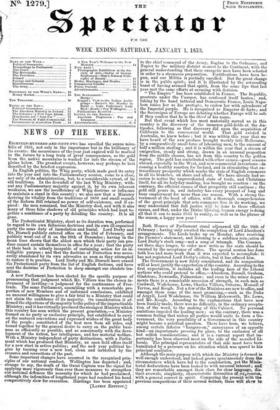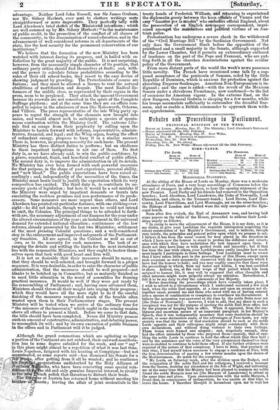Both Houses of Parliament stand adjourned till the 10th of
February ; having only awaited the completion of Lord Aberdeen's arrangements. The Lords broke up on Monday, after receiving the Premier's statement, and listening to a subdued reiteration of Lord Derby's stock song—not a song of triumph. The Commoi. sat three days longer, to order new writs as the seats should be vacated by the acceptance of office. The special session has dene both less and more work than it was expected to accomplish: it has not registered Lord Derby's edicts, but it has effaced him. The Government is now fairly constituted, and its composition will at least justify the expectation of the country. According to the first expectation, it includes all the leading men of the Liberal sections who could pretend to office,—Aberdeen, Russell, Graham, Gladstone, Newcastle, Palmerston : and even in the minor depart- merits there is a remarkable accession of strength, in such men as Cardwell, Wodehouse, Lowe, Charles Villiers, Osborne, Monsell of Tervoe, and Keogh. Not a few of the Ministers are new to office; and amongst them some of the most promising,—such as the Duke of Argyll, Lord Wodehonse, Sir William Voleaworth, Mr. Lowe, and Mi. Keogh. According to the explanations that have now been frankly made, there was no difficulty, in the ordinary accepta- tion of the word, to the making of this Cabinet. No personal ambitions impeded the leading men ; on the contrary, there was a Common feeling that unless all parties would unite to form a Go- vernment, the very possibility of a Government in this country might become a practical question. There have been, we believe, among certain inferior "hangers-on," annoyances of an opposite kind—an importunate pressing for place, to the exclusion of all but selfish considerations; and it is a current report that im- portunity has been observed most on the side of the so-called Li- berals. The principal representative of that side must have been humiliated by a pressure on his attention which was spared to his principal coadjutor.
Although the main purpose with which the Ministry is formed is well enough understood, and indeed grows spontaneously from the
circumstances which have led to the combination, yet the Minis- terial declarations have been looked to with unusual interest ; and they are remarkable amongst their class for clear language, dis-
tinct avowals, simplicity, characteristic diversities of expression, with a general concert in spirit. Comparing the.present with the previous compositions of their several writers, 'these will 8149w to
advantage. Neither Lord John Russell, nor Sir Tames Graham, nor Mr. Sidney Herbert ever sent to eledtors writings melte straightforward or more imprestitb, They perfectly tally with Lord Aberdeen's brief sketch of the Moistened interitamts ; whieh are well summed up by iit; Sidney ,Herbert: " in the inaiiitenatice of public credit, in the promotion of the comfort of all classes of the community, in the dissemination of sound education, and in the advancement of well-considered reforms in all departments of the state, lies the best security for the permanent conservation of our institutions."
We believe that the formation of the new Ministry has been watched with interest during its progress, and is hailed with sa- ffsfitefion by the great majority of the public. It is not surprising, however, from the necessarily simple character of its position, that ordinary party critics should find themselves at fault; and, with- eta the power to calculate future probabilities according to the rules of their old school-books, they resort to the easy device of Showing judgment by growling. The Protectionists of course are furious; and they must be allowed a licence to vent the natural ebullitions of mortification and despair. The most Radical Re- formers of the middle class, as represented by their organs in the press, seem to be perplexed. They attack the nascent Government because its avowals are not conceited in the spirit of the Complete Suffrage platform; sod at the same time they are ex-officio Om- pelled to rejoice in the admission of men like Molesworth, Osborne, and Villiers. The press representative of the late Whig party ap- pears to regret the strength of the elements now brought into union, and would almost seek to anticipate a species of sponta- neous combilstiOtt within the Ministry itself. The extreme Libe- rals find an escape froth their perplexity by calling upon the Ministers to hasten forward with reforms, representative, adminis- trative, financial, and legal ; and the Whig organ, fearing the effect of redundant energy, proposes to busy it in a siinilar manner. There is, however, to pressing necessity for such haste. The present Ministry has three distinct duties to perform; but an obedience to these impatient instigations is not one of them. Its first duty is, as we have already said, to wio the public confidence, by
grave, consistent, frank, and beneficial conduct of public affairs.
e second duty is, to improve the administration in all its details. No Ministry has ever been formed with such powerful resources for that purpose, in the shape of past experience, personal ability, and "new blood." The public expectations have been raised ac- cordingly; and, independently: of the necessities of the times, the Ministry lutist bestir itself to justify the expectation Which its very composition has eicited. The third duty is, to contribute its ne- cessary quota of legislation : but here it would be a sad mistake if the Ministry were urged by impatient demands or taunts into emulating the reckless promises and non-performance of its prede- bessors. Some Measures are more urgent than others, and Lord Aberdeen has pointedoitt particular features, With one striking over- sight—he did not include, though we are sure he could not intend to omit, the Colonies. The principal things to be attended to forth- with are, the necessary adjustment of our finances for the year under the altered circumstances of the year; an instalment in the universal demand for extended national education ; continuance of the law reforms, already prosecuted by the last two Ministries; settlement of the: most pressing Colonial questions ; and a well-considered Step in the enlargement and improved safeguards of the Parliament, arzr franchise. All are agreed, in the Cabinet as well as out of
ors, s to the necessity for such measures. The task of ar- ranging
the details and settling the limits for the next instalment lies with the responsible Ministers, and they ought to bestow them- selves upon that task with good heart and firm will.
It is not so desirable that their measures should be many, tis that they should be -well-selected, mid brought forward iii a proper sequence. It is very desirable, in order to raise the character of public adininistintion, that the measures should be well prepared.—not blanks to be botched up in Committee, but so Maturely finished as to need little alteration in the worst of assemblies for fronting practical iliettattres. It would be well if they were got ready by the reassembling of Parliament ; and, having once advanced them, Ministers should throw all their weight into urging their progress; which they would have all the more right to do if the carefu finishing of the measures superseded much of the trouble often Wasted upon them in their Parliaineetary stages. The present Ministry Will be tested when we arrive at the ordinary time for "the massacre of the innocents," which ought in the coming session above all others to present a blank. Before we come to that date, the bills should have been completed. Never did Ministry possess such an amount of constructive, administrative, and debating power, to accomplish it will; and by its own execution of public business in the offices and in Parliament will it be judged.

































 Previous page
Previous page